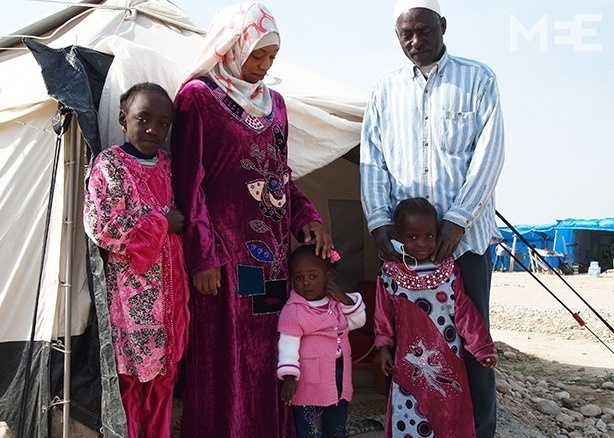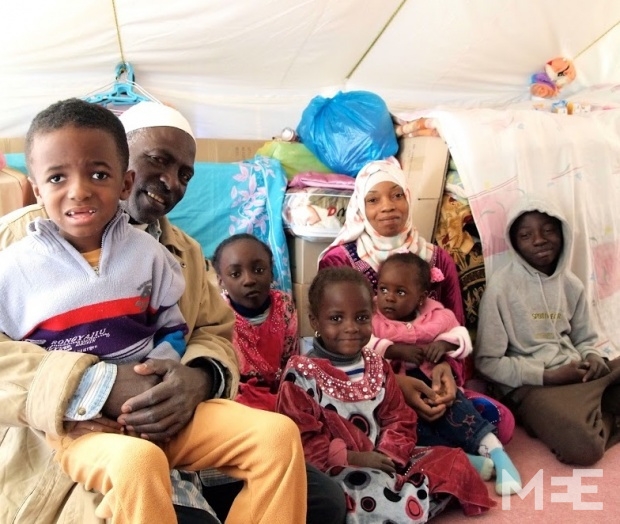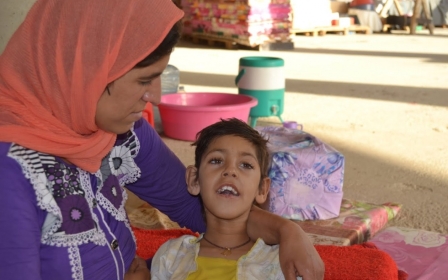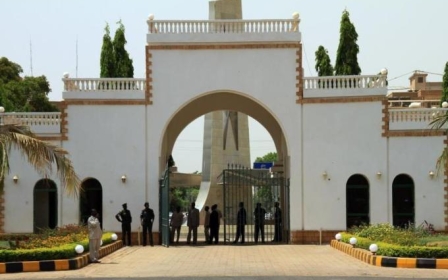Memories of good life fade for displaced Sudanese in Iraq

KIRKUK, Iraq - Fifty-year-old Adam rocks his youngest daughter in his arms in an attempt to soothe her crying. “I hope she will be like Susan Rice and marry someone like Obama,” grins the father-of-five.
Like the rest of Iraq’s approximately 1.9 million internally displaced persons (IDPs), Adam and his family were forced to flee their home as a result of the ongoing violence in the country’s north; but unlike most of them, he is from Sudan.
“In 1986 there were problems in my country between militias and the government – I don’t like to fight so I became a refugee,” said Adam in reference to the ongoing unrest that has plagued his country since its independence from Britain and Egypt in 1956. Instead of taking up arms in the poorly funded Sudanese army and taking part in what was then the second phase of the north-south civil war, Adam avoided military service by fleeing his hometown of Wad Madani in east-central Sudan.
In 1988 the then 24-year-old travelled across the Red Sea by boat, reaching Jeddah and then on to Egypt, where he was able to fly to Baghdad, becoming one of the estimated 670,000 Sudanese refugees living outside the country, in addition to 2 million internally displaced. “When you came to Iraq, whether you had a job or not, the Iraqi government at that time would pay you $1,800 per year,” said Adam.
“Iraq was open for all Arab countries. It was difficult to go to the Gulf countries. I am not educated and don’t have a degree. I’m a simple man. I was a farmer,” he explained, kneeling down on the floor of his white UNHCR tent.
In July Adam and his family fled Al Shirqat – situated between Mosul and Tikrit – following the Islamic State’s takeover of the area and travelled east to the disputed city of Kirkuk, where they were housed in a school. When the academic year began in September they were forced to relocate to Laylan camp, south west of the city. At least 7,500 people have also sought shelter in the same camp despite the UNHCR's initial projected capacity being for 6,000.
Adam recalled a safe and socially inclusive Iraq, one that survives only in the collective memory of its people. “Life was good, you can’t imagine how good it was,” he said, adding that at the time there was freedom to move safely between different provinces. The young refugee was hired to work on a construction site, building an arms factory with another 30 foreigners, including Bangladeshis and Sudanese men.
“Every day there was plenty of meat and cheese,” he laughed. Adam was one of the more fortunate Sudanese refugees in Iraq. According to a 2008 UN report, a group of 97 Sudanese who fled Sudan in the late 1980s had been stranded in a makeshift camp in the Iraqi desert since 2005 and had suffered “abuse, blackmail, eviction and assaults by militias following the fall in 2003 of the Saddam Hussein regime”.
But when sectarian violence broke out in 2006 life changed dramatically for everyone and in particular for the more vulnerable immigrants. “At that time all Sudanese in Iraq felt endangered. When we had money in our pockets, the Sunni and Shia militias would take it from us. Some Sudanese went to work on American bases to be protected, but I had a family, I couldn’t move.”
Despite being employed, Adam insisted that the money he earned was often not enough to send back to his family in Sudan: “It was not even enough for me. When I married I stopped sending it back.” Today he works distributing kerosene to the 1,400 families in Laylan camp and earns about $200 a month. But this, he says, is not enough to feed his family of six. “For a long time the UN has not given us any food and now we have no choice, we have to buy the food,” said Adam, as his young wife settled down quietly beside him.
Autaef Saeed is elegant in her mannerisms and speaks softly. The 32-year-old from the southern port city of Basra holds Iraqi citizenship, however her three daughters and two sons have inherited their father’s nationality.
“My children wanted to move [from Al Shirqat]. When we slept in the garden and they heard the planes they were very scared,” she said when asked about the fall of Mosul and subsequent Iraqi airstrikes.
“I don’t mind Daesh [an Arabic acronym for the Islamic State], they are not a problem for civilians but only for the military and police forces. But my children were scared because they had weapons, big beards and wore masks,” said Adam. “[For me] the big problem was the Iraqi airstrikes,” he added.
According to Adam, 80 to 90 people were killed each week by Iraqi airstrikes in and around his city during the first weeks of the Islamic State’s takeover. “The strikes were targeting civilians on the streets. My friend is dead. Our neighbours died, there were children too. I have faith and believe that everybody must die some day but when I saw my children being scared by the planes…” he trailed off.
Before reaching Kirkuk, Adam drove them to Makhmour where they encountered heavy clashes between Kurdish Peshmerga forces and the Islamic State and quickly changed direction. “It was a perfect welcome from the Kirkuk people, everybody helped – the churches and the mosques, they all helped us,” said Adam, despite the difficulties they faced, including lack of power, water, food and money. “We were only eating bread and drinking tea,” he said.
Despite the warm welcome, Autaef admitted to not having strong ties with the rest of the community in the camp, preferring to keep to herself. “Everybody gossips - they talk about who gets money from the government and who doesn’t. There is a lot of chattering in the kitchen. I stay out of it,” she explained as her youngest curled up on her lap.
“There are no strong relations between us and them, but we know them and welcome them,” said their neighbor Qais, a young father-of-two from Fallujah. “There is a strong friendship between the rest of us,” he added, hinting at the Sudanese family’s marginalisation.
But UNHCR international relief and development programme manager Azad Abdulhameed was adamant that they had not had trouble integrating into the camp community, so much so that he chose to hire Adam to distribute kerosene.
“I don’t like this place, I miss everything about home,” said 14-year-old Omar, the eldest of Adam’s five children. His nine-year-old sister Kawther nodded in agreement: “We had school and a home, we don’t have anything here,” she said. Despite their dislike of the camp, both children appeared to have integrated and made friends – a task that is often easier for children than it is for adults.
While Laylan camp is not home to the young family, Sudan is not an alternative: “I can’t buy the tickets to take everyone to Sudan, and I like Iraq,” said Adam.
“All Iraq is one for me – Yazidis, Christians, Sunni, Shia. They are all one,” he added, making his way out of the tent and back onto the dusty paths that snake through the barren camp.
Stay informed with MEE's newsletters
Sign up to get the latest alerts, insights and analysis, starting with Turkey Unpacked
Middle East Eye delivers independent and unrivalled coverage and analysis of the Middle East, North Africa and beyond. To learn more about republishing this content and the associated fees, please fill out this form. More about MEE can be found here.





